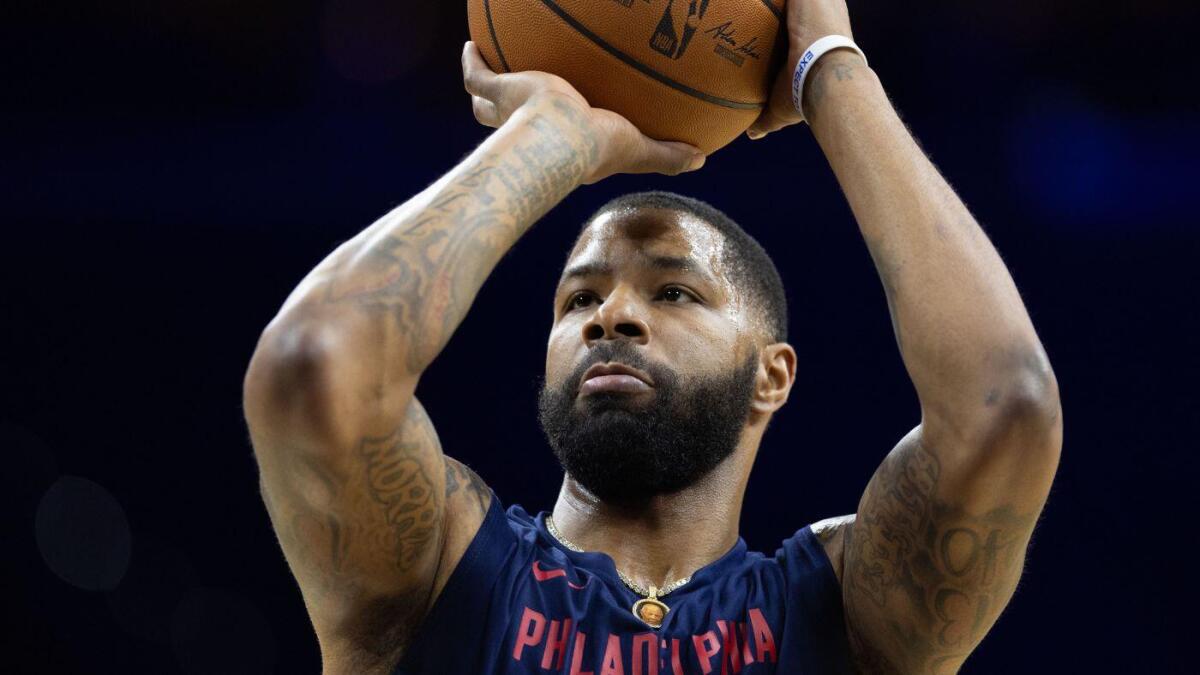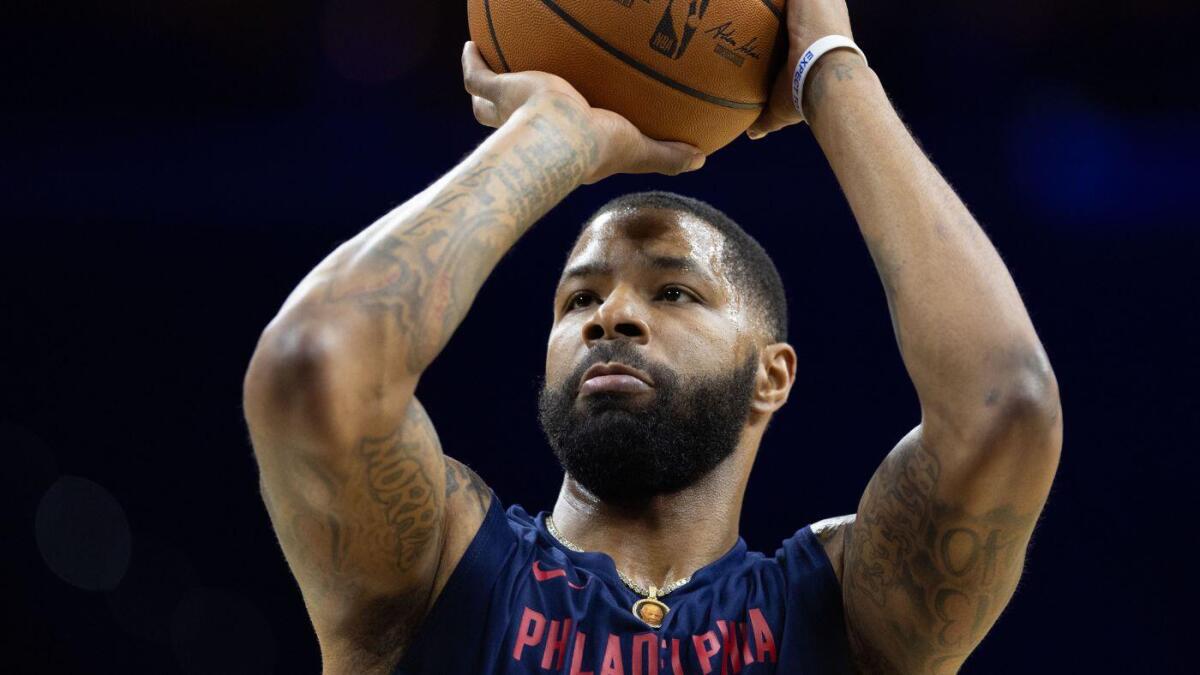The High-Stakes Gamble: Marcus Morris Sr.’s Casino Controversy
Introduction: A High-Profile Fall from Grace
The intersection of professional sports and high-stakes gambling has always been a volatile mix, but when allegations of fraud and financial mismanagement enter the equation, the consequences can be devastating. Marcus Morris Sr., a seasoned NBA veteran, finds himself at the center of a legal storm following his arrest on felony fraud charges related to unpaid casino debts. The case has sent shockwaves through the sports community, raising questions about financial responsibility, the pressures of professional athletics, and the darker side of gambling culture.
The Allegations: A House Always Wins
At the heart of the controversy are allegations that Morris defrauded two of Las Vegas’s most prestigious casinos: the MGM Grand Hotel & Casino and the Wynn Las Vegas. According to court documents, Morris allegedly obtained $115,000 from the MGM Grand in May 2024 by writing bad checks—checks that bounced due to insufficient funds. The remaining $150,000 is tied to debts incurred at the Wynn Las Vegas during the same period.
In Nevada, failing to repay a casino marker—a short-term line of credit—exceeding $1,200 is treated as a felony. Given the substantial amounts involved in Morris’s case, he faces multiple felony counts, including two counts of theft of $100,000 or more. These charges carry significant penalties, including potential prison time and hefty fines.
The Arrest and Aftermath: A Public Spectacle
Marcus Morris Sr. was arrested on Sunday, July 27, 2025, at Fort Lauderdale-Hollywood International Airport in Broward County, Florida, based on an out-of-state warrant. He was subsequently denied bail and spent 51 hours in jail. Morris has vehemently denied the fraud allegations, claiming a “mix-up” and lashing out at Las Vegas in a social media post, stating “F— Vegas.” He also alleges that he was held without food or water during his incarceration.
His agent has attributed the situation to an “insufficient funds check” related to a casino marker, but maintains that it’s a misunderstanding. Morris’s brother, Markieff Morris, has also confirmed the situation, although details about his involvement, if any, remain unclear.
The Defense: A House of Cards?
While details of Morris’s legal strategy are still emerging, several lines of defense seem plausible. The first centers on the claim of a “mix-up” and the assertion that the bad checks were unintentional. This would require demonstrating that Morris genuinely believed he had sufficient funds to cover the checks at the time they were written and that any discrepancies were the result of banking errors or other unforeseen circumstances.
Another potential defense could involve challenging the prosecution’s evidence regarding the specific amounts owed and the circumstances under which the casino markers were issued. This might involve scrutinizing the casino’s internal records and procedures, questioning witnesses, and presenting expert testimony on gambling debts and related financial transactions.
Finally, Morris could argue that he intended to repay the debts but was unable to do so due to unforeseen financial difficulties. While this wouldn’t necessarily negate the fraud charges, it could potentially mitigate the penalties imposed if he is ultimately convicted.
The Broader Context: Gambling and Professional Athletes
This case shines a spotlight on the complex relationship between professional athletes and gambling. The intense pressure to perform, the readily available disposable income, and the competitive spirit that drives athletes can all contribute to an increased risk of developing gambling problems.
The NBA, like many professional sports leagues, has strict rules and regulations regarding gambling, both to protect the integrity of the game and to safeguard the well-being of its players. Players are generally prohibited from betting on NBA games or associating with individuals involved in illegal gambling activities.
While it’s important to emphasize that not all athletes who gamble develop problems, the potential for addiction and financial ruin is real. The Marcus Morris Sr. case serves as a cautionary tale about the potential consequences of unchecked gambling and the importance of responsible financial management.
Potential Ramifications: A Costly Gamble
The legal and reputational ramifications for Marcus Morris Sr. are significant. If convicted of the felony fraud charges, he could face a lengthy prison sentence, substantial fines, and a criminal record that could impact his future employment prospects.
Even if he is acquitted or the charges are dropped, the scandal has already tarnished his reputation and could affect his ability to secure future NBA contracts or endorsement deals. The negative publicity associated with the case could also damage his credibility as an ESPN analyst.
The case also has broader implications for the NBA and its efforts to promote responsible gambling. It underscores the need for ongoing education and support programs for players to help them manage their finances and avoid the pitfalls of gambling addiction.
High Stakes, Uncertain Outcome
The Marcus Morris Sr. casino fraud case is a complex and multifaceted legal drama that has captivated the attention of the sports world. The allegations are serious, the potential consequences are severe, and the outcome remains uncertain. As the legal proceedings unfold, the case will undoubtedly continue to generate headlines and spark debate about the responsibilities of athletes, the dangers of gambling, and the intersection of sports and entertainment.
The case also serves as a stark reminder of the high-stakes nature of professional athletics and the delicate balance between success and failure. For Marcus Morris Sr., the road ahead is fraught with challenges, but it also presents an opportunity for redemption and a chance to learn from the mistakes of the past. The outcome of this case will not only shape his future but also send a powerful message to the sports community about the importance of financial responsibility and the dangers of unchecked gambling.












